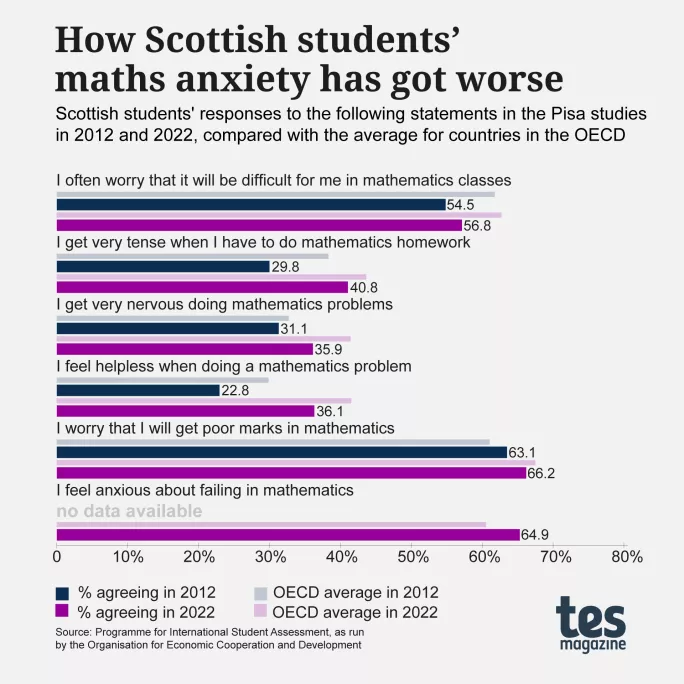Pisa: Most Scottish teenagers anxious about maths

Two-thirds of Scottish 15-year-olds worry about getting poor marks in maths and almost two-thirds feel anxious about failing in maths.
And more than half say they often worry that maths classes will be difficult, according to data collected through the 2022 Programme for International Student Assessment (Pisa).
The figures, obtained by Tes Scotland, also show that students are more tense, nervous and worried about maths than they were a decade ago in 2012, the last time that maths was the main focus of Pisa.
In 2012 less than a quarter of students in Scotland reported feeling helpless when doing maths problems - but by 2022 over a third reported feeling helpless.

The Pisa results, published in December, assessed 15-year-olds’ performance in maths, science and reading.
Scotland’s results were worse across the board than the last time Pisa ran in 2018, with the country’s score for maths falling by 18 points.
The Organisation for Economic Cooperation and Development (OECD), which runs the tests, says 20 points is roughly equivalent to a year of learning. While there was a decline in scores internationally, the OECD said that Scotland’s decline in maths was steeper than elsewhere.
- Background: Scotland’s Pisa scores drop across the board
- Related: Scotland curriculum update, maths to be first priority
- Interview: Tes’ 10 questions with... maths teacher Chris Smith
- Long read: Is this how to make maths more appealing to teenagers?
A total of 3,257 Scottish students were involved in the Pisa tests, which also asked a range of questions about their background, experiences in school, life satisfaction and habits.
In its 2015 review of Curriculum for Excellence, the OECD warned that greater levels of maths anxiety were associated with a drop in Pisa scores, and the issue of maths anxiety in Scotland warranted “close attention”.
However, Scottish students’ feelings about maths have become more negative since then.
Still, the figures suggest that students in other countries often share their apprehension, given that the Scottish scores for maths anxiety are typically near or below the OECD average.
Maths anxiety in Scotland’s schools
The figures also suggest that Scottish students find the thought of doing maths worse than the reality - for example, while six in 10 feel anxious about failing maths, fewer report actually getting very nervous when doing maths problems.
Nevertheless, the figures will be disappointing for the Scottish government, which in 2016 received the final report of the Making Maths Count group, which was set up with the aim of improving enthusiasm for the subject.
Maureen McKenna, formerly Glasgow’s director of education, who began her career as a maths teacher, chaired the group. That students had become more worried about maths reflected “a sad picture for our teenagers”, she said.
She added that the results were “perhaps indicative of the stress we place on our young people about the importance of qualifications” - exam pressure was leading “potentially to too much teaching to the test, as opposed to exploring maths”.
“Gaining qualifications is, of course, important but it should not be at the expense of the wellbeing of our young people,” said Ms McKenna.
Too much rote learning?
Scottish school qualifications have recently been the subject of an independent review. It found “a great deal of learner time was spent on rote learning and examination rehearsal” and recommended scrapping external exams for qualifications below Higher level.
Maths qualifications at National 5 and Higher have no coursework component, so grades depend entirely on performance in the exam, which makes the subject distinctive in Scotland.
However, Ms McKenna also said that, given the coronavirus pandemic, it was perhaps unsurprising that students sitting Pisa tests in 2022 were more nervous and worried than in 2012.
Christian Bokhove, professor in mathematics education at the University of Southampton, meanwhile, said that maths anxiety in Scotland was worse than in England, which outperformed Scotland in all three Pisa domains in 2022 (reading and science being the others).
He added that maths anxiety in Taiwan was even higher, although it does much better in maths.
Professor Bokhove said it was important to look at all aspects of student performance, but warned it is “hard to pinpoint one particular ‘silver bullet’ to address”.
Register with Tes and you can read two free articles every month plus you'll have access to our range of award-winning newsletters.
Keep reading with our special offer!
You’ve reached your limit of free articles this month.
- Unlimited access to all Tes magazine content
- Save your favourite articles and gift them to your colleagues
- Exclusive subscriber-only stories
- Over 200,000 archived articles
- Unlimited access to all Tes magazine content
- Save your favourite articles and gift them to your colleagues
- Exclusive subscriber-only stories
- Over 200,000 archived articles



